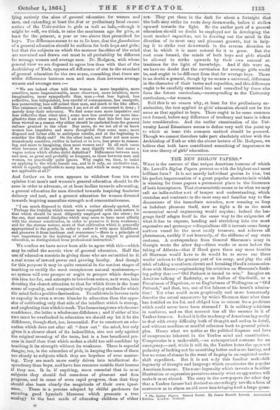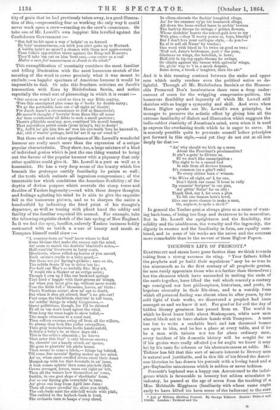THE NEW BIGLOW PAPERS.*
WHAT is the essence of that unique American humour of which Mr. Lowell's Biglow Papers present us with the highest and most brilliant form ? It is not merely individual genius in him, but his perfect impersonation of a great popular characteristic which is winning for these papers a permanent place in the literature of both hemispheres. That characteristic seems to be what we may call an india-rubber sort of temper and understanding, which stretches and contracts in the most easy and familiar way to the dimensions of the immediate occasion, now seeming as limp as indolent pleasure itself, now as tight a. fit as the most economical moral: engineering would require; indeed the lan- guage itself adapts itself in the same way to the exigencies of what it has to express, bending and stretching into the most expressive and grotesque colloquialisms till it invents some funny earthen vessel for the most costly treasure, and relieves all phenomena, earthly if not heavenly, of the stiffness of any state costume. A correspondent from General Sherinan's army in Georgia wrote the other day—three weeks or more before the taking of Atlanta—that if Hood gave them any more trouble all Sherman would have to do would be to serve out three weeks' rations to the greater part of his army, and play the old trick of taking a southern circuit and breaking Hood's communica- tions with Macon;—epitomizing his criticism on Sherinan's flank- ing policy thus :—" Old Pothook is bound to win." Imagine an Austrian talking of Radetzky, or an Italian of Garibaldi, or a Frenchman of Napoleon, or an Englishman of Wellington us" Old Pothook," and that, too, out of the fulness of his heart's admira- tion! Yet what could more graphically and more humorously describe the actual manceuvre by which Sherman time after time has doubled on his foe, and obliged him to retreat from positions which could never have been stormed ? It is niilitary'criticism in nankeens, and on that account has all the essence in it of Yankee humour. Indeed it is the tendency of American ingenuity to deal with every difficulty both of thought and action in detail, and without needless or needful reference back to general princi- ples. Hence what we notice as the political limpness and love of compromise inherent in the Yankee mind and constitution. Compromise is a make-shift,—an extemporized costume for an emergency,--and, while it will do, the Yankee hates the apparent pedantry of looking out for something better and more lasting, and has no sense of shame in the want of keeping in an empirical make- shift expedient. But it is not only this familiar makeshift ingenuity of thought and language which constitutes the popular American humour. The LIM ingenuity which invents a familiar illustration or expression perceives exactly what exeggaration will makoit most absurd. The story in the newspapers the other day that a Yankee farmer had devised RO exceedingly terrific a form of scarecrow as to alarm an old crow into bringing back a large quan- 77ae Bigkas Papers. Second, Series. By James Russell Lowell. Authorize& Edition. London: Trubuer.
tity of grain that he had previously taken away, is a good illustra- tion of this,—representing fear as working the only way it could never work upon a crow—reacting on the crow's conscience. Or take one of Mr. Lowell's own happiest hits levelled against the Confederate Government :—
"But Jeff he hit upon a way o' helpin' on us forrard By bein' unannermous,—a trick you ain't quite up to Norrard. A baldin hain't no more'f a chance with them new apple-corers Than folks's oppersition views against the Ring-tail Roarers; They'll take 'em out on him 'bout east,—one canter on a rail .11fas a man feel unannermous ez Jonah in the whale."
This exemplification of unanimity combines the most familiar and telling illustration with the most humorous stretch of the meaning of the word to cover precisely what it was meant to exclude ;—a happier specimen of American humour it would be impossible to find. Or take this Southern criticism on Jacob's transaction with Esau by Birdofredum Sawin, and notice especially the retail sort of phraseology in which it is recast :—
"Oar system would ha' c3ird 113 thru in any Bible cent'ry,
'Fore this onscripterl plan come up o' books by double entry; We go the patriarkle here out o' all sight an' hearin', For Jacob warn't a circumstance to Jeff at flnancierin% He never'd thought o' borryin' from Esau like all nater An' then cornfiseatin' all debts to sech a small pertater •
There's plitickle econ'my, now, combined 'ith morril beauty,
That saycrifices privit eends (your in'my's, to) to dooty!
Wy, Jeff'd ha' gin him five an' won his eye-teeth 'fore he knowed it, An', st,id o' wastin' pottage, he'd ha' eat it up an' owed it."
But these and most other specimens of Mr. Lowell's wonderful humour are really much more than the expression of a unique popular characteristic. They show, too, a large mixture of a kind of individual genius which is just the one thing wanted to bring out the flavour of the popular humour with a piquancy that only other qualities could give it. Mr. Lowell is a poet as well as a hurnourist. He has a very deep sense of the beauty which lies beneath the grotesque earthly familiarity be paints so well ; of the truth which outlasts all ingenious compromises ; of the immutable law which conditions the American flexibility ; of the depths of divine purpose which overrule the sharp turns and doubles of Yankee ingenuity ;—and with these deeper thoughts and feelings agitating his mind he is able to give the requisite foil to the humorous picture, and so to sharpen the satire a hundredfold by indicating the fixed point of his thought's departure, as well as tracing with pliant hand the oddity and facility of the familiar empirical life around. For example, take the following exquisite sketch of the late spring of New England. In it we find the spry, familiar, unlovely Yankee 'cuteness boldly contrasted with as lavish a sense of beauty and music as Tennyson himself could show :—
"I, country-born an' bred' know where to find Some blooms that make the season suit the mind, An' seem to metch the doubtin' bluebird's notes,— Half-vent'rin' liverworts in furry coats, Bloodroots, whose rolled-up leaves ef you oncur/, Each on'em's cradle to a baby-pearl,- But these are jes' Spring's pickets ; sure ez sin, The rebble frosts '11 try to drive 'ern iu ; For half our May's so awfully like May n't, 'T would rile a Shaker or an evrige saint ; Though I own up I like our back'ard springs Thet kind o' haggle with their greens an' things, An' when you 'most give up, without more words Toss the fields full o' blossoms, leaves, an' birds : Thet'a Northun natur', slow an' apt to doubt, But when it does git stirred, ther"s no gin-out! Fnst come the blackbirds clatt'rin' in tall trees, An' settlin' things in windy Congresses,— Queer politicians, though, for I'll be skinned Ef all on 'em don't head aginst the wind. 'Fore long the trees begin to show belief,— The maple crimsons to a coral reef,
Then saffern swarms swing off from all the willers, So plump they look like yeller caterpillars, Then gray hossches'nuts leetle hands unfold, Sot teen a baby's be at three days old : This is the robin's almanick ; he knows Thet arter this ther"s only blossom-snows; So, choosin' out a handy crotch an' spouse, He goes to plast'rie his adobe house. Then seems to come a hitch,— things lag behind, Till some fine mornin' Spring makes tqi her mind, An' ez, when snow-swelled rivers creak their dams Heaped-up with ice thet dovetails in an' jams, A leak comes spirtin' thru some pin-hole cleft, Grows stronger, fencer, tears out right an' left, Then all the waters bow themselves an' come, Suddin, in one gret slope o' shedderin' foam, Jes' so our Spring gits everythire in tune, An' gives one leap from April into June: Then all comes crowdin' in; afore you think, The oak-buds mist the side-hill woods with pink, The catbird in the laylock-bush is loud, The orchards turn to heaps o' rosy aloud, In ellum-shronds the flanhin' hengbird clings, An' fer the summer vy'ge his hammock slings, All down the loose-walled lanes in archin' bowers The barb'ry droops its strings o' golden flowers, Whose shrinkin' hearts the school-gals love to i'ry ' With pins,—they 'll worry yourn so, boys, bimeby ! But I don't love your cat'logue style, —do you ?— Ez ef to sell all Natar' by vendoo ; One word with blood in I's twice ez good ez two : 'Nuff Bed, June's bridesman poet o' the year, Gladness on wings, the bobolink, is here; Half-hid in tip-top apple-blooms he swings, Or climbs against the breeze with quiverin' wings, Or, givin' way to 't in a mock despair, Runs down, a brook o' laughter, thru the air."
And it is this running contrast between the under and upper note which really renders even the political satire so de- lightful. Through all Mr. Birdofredurn Sawin's or the Honour- able Preserved Doe's lucubrations there runs a deep under- current of scorn for the wriggling compromise-politics, the humorous flexibility and ingenuity of which Mr. Lowell still sketches with so happy a sympathy and skill. And even when Hosea Biglow speaks out Mr. Lowell's own principles, he manages to preserve the artistic effect by giving him all the extreme familiarity of dialect and illustration which suggests the india-rubber elasticity of Jonathan's mind, even when it is used to express the everlasting truth which he is eager to serve. It is scarcely possible quite to prostrate oneself before principles put forward in this style,—and yet they do not cut at all less deeply for that :— "An' why should we kick up a muss
About the Pres'dunt's proclamation?
It ain't a-goin' to lib'rate us, Ef we don't like emancipation : The right to be a cussed fool Is safe from all devices human, It's common (ez a ginel role) To every critter born o' woman.
"So We're all right, an' I, ter one, Don't think our cause '11 loose in vally By rammin' Scriptur' in our gun, An' gittin' Natue fer an ally : Thank God, say I, fer even a plan To lift one human bein's level, Give one more chance to make a man, Or, anyhow, to spile a devil !"
In general the Yankee genios always gives us a sense of want- ing back-bone, of being too limp and dexterous to be masculine.. But in Mr. Lowell the uprightness and the flexibility, the solidity and the nimbleness, the veracity and the ingenuity, the dignity in essence and the familiarity in form, are equally com- bined, and in none of his works are the union and the contrast more remarkable than in the newest of these Biglow Papers.































 Previous page
Previous page